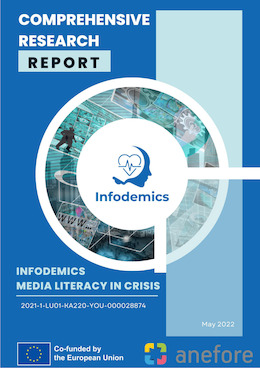Toolbox — For Training and Youth Work
All new tools in your inbox: Be the first to know about new tools for learning with our e-mail notifications.
Report
Media Literacy in Crisis - Comprehensive Research Report
During the Erasmus+ project ‘Infodemics’ (project code: 2021-1-LU01-KA220-YOU-000028874), the partner organizations conducted research on the topic of misinformation related to health and wellbeing in digital contexts, focusing on youth as a target group.
Aims of the tool
By providing information on the mentioned issues and analyzing them further, this report aims to explore the possibilities that the DigComp framework can provide in order to develop a more specific approach that serves youth in the enhancement of their digital competence in relation to health and well-being. This is done by developing competence statements for the DigComp framework that focus on the relevance of health and wellbeing in the midst of the vast amount of information available on the Internet. Additionally, the report will also serve as a base for building up the next project results, as the created competence statements will be used for building a Self-Assessment Tool that will provide young people with an overview of their own digital and media literacy competencies in line with the DigComp framework, which already provides a common understanding of what digital competence is.
Description of the tool
As far as results are concerned, in the European context, our research identified that major issues encountered by youth in regards to digital misinformation in the health and wellbeing areas are such as being exposed to a large amount of information, often promoted by algorithms, marketing strategies or false experts. They also encounter challenges related to cybersecurity, cyberbullying, digital harassment and online violence. Besides, young people are often considered “digital natives”, but the truth is that the fact that young people were born with new technologies does not mean that they inherently know how to use them safely.
In this context, youngsters need to develop their digital skills to be able to navigate the Internet with safety and preserve both their physical and mental health. For that matter, learning how to fact-check, becoming a critical thinker, learning about media literacy, using a variety of sources of information, communicating with others about the challenges one is facing in online environments, and being aware of making correct use of digital tools is crucial.
Taking all the mentioned into consideration and after conducting all the necessary research both in the partner countries and at the European and international levels, the partner organizations have thoroughly developed DigComp competence statements with the will to support youth in the enhancement of their digital competence and the preservation of their health while being exposed to digital environments.
Available downloads:
Disclaimer
SALTO cannot be held responsible for the inappropriate use of these training tools. Always adapt training tools to your aims, context, target group and to your own skills! These tools have been used in a variety of formats and situations. Please notify SALTO should you know about the origin of or copyright on this tool.
Tool overview

http://toolbox.salto-youth.net/3358
This tool is for
Youth workers, Youth leaders, Educators, Project Managers
and addresses
Personal Development, Youth Participation
It is recommended for use in:
Transnational Youth Initiatives
Strategic Partnerships
Behind the tool
The tool was created by
Formation et Sensibilisation de Luxembourg (Luxembourg), Pontydysgu SL (Spain), SYNERGASIA ENEGON POLITON (Greece), SwIdeas AB (Sweden)
in the context of
Erasmus+ KA2 project ‘Infodemics’ (project code: 2021-1-LU01-KA220-YOU-000028874)
The tool was published to the Toolbox by
Seg Kirakossian (on 15 October 2022)
and last modified
9 October 2022
Comments
No comments have been posted yet.
If you want to comment on this tool, you need to be signed in with your MySALTO account. Sign in now